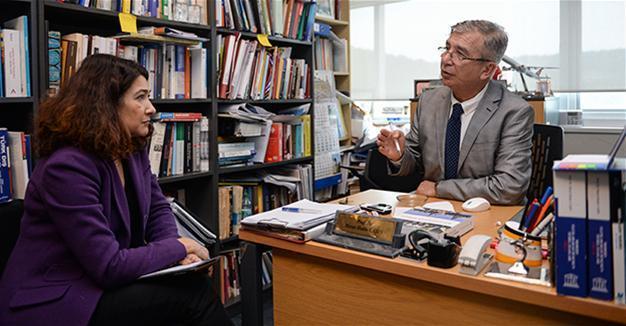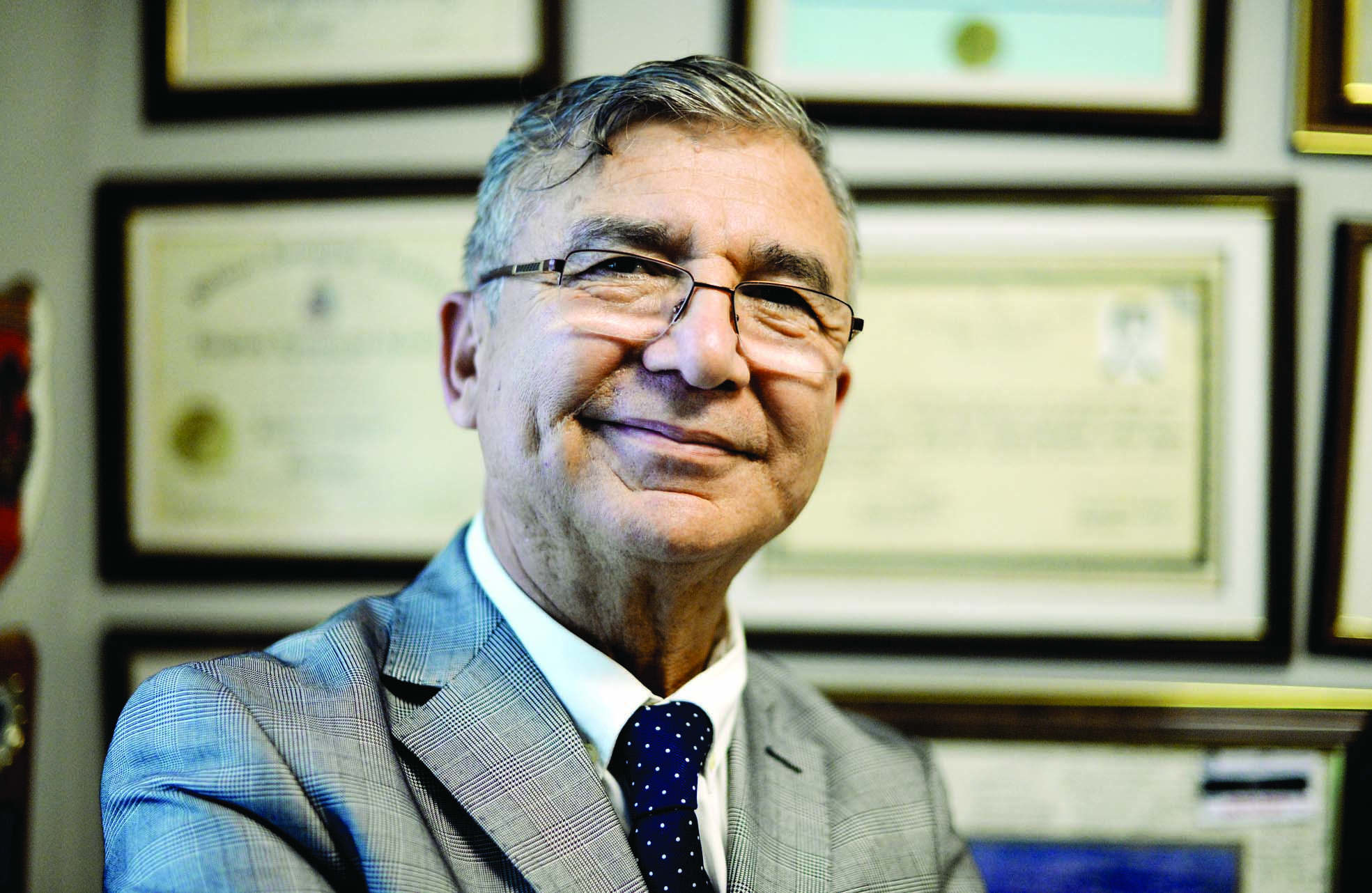US, Russia will never give up the Kurdish card in Syria
Barçın Yinanç - barcin.yinanc@hdn.com.tr
 Moscow is unlikely to ever give up its Kurdish card despite Turkey’s requests that Russian President Vladimir Putin end cooperation with the Syrian Kurdish Democratic Union Party (PYD), a former soldier and political analyst has said.
Moscow is unlikely to ever give up its Kurdish card despite Turkey’s requests that Russian President Vladimir Putin end cooperation with the Syrian Kurdish Democratic Union Party (PYD), a former soldier and political analyst has said.“[The outlawed Kurdistan Workers’ Party] PKK/PYD cooperates with both the Americans and the Russians; they have become an actor in the field,” said Professor Mesut Hakkı Caşın of Özyeğin University, noting that Washington is also unlikely to abandon the group.
One of the most important subjects that was discussed between Turkish President Recep Tayyip Erdoğan and Russian President Putin was Syria. Tell us about Russia’s short- to mid-term plans in Syria.
While coalition forces were hitting the Islamic State of Iraq and the Levant (ISIL), Russia intervened and with a massive transfer of military force, changed all the balances in Syria.
The regime forces, which had withdrawn to 15 percent of the country, started to gain strength after the Russian intervention and came to Aleppo.
Meanwhile, Russia has also taken the Syrian Kurds on its side. The Russians invited the Syrian Kurds to Moscow and conducted an unofficial meeting process with them.
And after a while, they have recognized the Kurds’ presence in Rojava, using them as a trump card.
Following the downing of the Russian war plane by Turkey [in 2015], Russia stepped up setting its intelligence mechanisms in Syria and started sharing images of its satellite intelligence with the PKK/PYD.
The Russians wanted to punish Turkey. We can deduce that from the PKK’s activities as well, as [Russian] satellite intelligence information was found on captured PKK members.
Meanwhile, Russia has changed the balance of power in the Black Sea, too, by reinforcing its military presence in Armenia, employing additional missiles and MiG 29 warplanes in the country.
In a way, this was also a show of force against the United States. Let’s not forget that for the first time in history, Russian and Chinese naval forces conducted joint drills in the eastern Mediterranean. The Chinese navy went to the Black Sea. This has been a development that changes the balance of power.
So can we say with confidence that Russia is now well-established to Turkey’s south?
Russia is in Syria to stay. It has a very big military and political power. It can carry this over to Iraq, too.
At any rate, Russia [through its policy], has said it will not allow any fait accompli in the region without its military and political approval. The Russians have reflected this stance in the field. The motivation of Russian soldiers is very high, and this has earned Putin great support in domestic politics.
The notion of power is very important in the Russian mentality. So we can say that the Russian bear has reached the Mediterranean.
In addition, it has now been recognized in the United Nations and in the European Union that the Syrian crisis cannot be solved without Russia.
Russia has proved itself to be an indispensable actor. It now has two naval bases and one air base. It has used its state-of-the-art weapons and increased its exports to 15 billion dollars, again becoming the biggest supplier of weapons in the region after the United States.
How do you see Turkey’s position? It seems the government has changed its priorities in Syria.
Turkey’s priority is to have terrorism under control. The most important threat is the fact that the PKK has gained ground in Syria. It gained serious ground and in fact, it carried its gains to Iraq as well. It won [control over] areas where Massoud Barzani [the president of the Kurdistan Regional Government – KRG] is weak.
In addition, the PKK is gaining legitimacy. It created the image of an organization that favors a secular structure against a radical religious organization. We see a PKK/PYD which can cooperate with the Russians and the Americans, which means it has become an important actor in the field.
Right up to Hatay [on the Turkish Mediterranean] there is a structure of Kurdish cantons. By acting together with Russia and undertaking the Euphrates Shield Operation, Turkey has eliminated the risk of the establishment of a [Kurdish] cantonal state.
Turkey is back at the table and in the field, and this has been possible with the support of Russia. But in exchange, Turkey has accepted to have the South Stream [gas pipeline] pass through Turkey.
How about the U.S.’ new administration; can you make sense of their intentions?
For the U.S., the priority is Israel’s security. Washington would not tolerate a threat against Israel’s security. There is no change on that point.
While looking at the U.S., we should recall that the support given to the [Justice and Development Party] AKP to assume the role of a moderate Islamic country has changed. The Arab Spring has been a turning point in that sense.
But coming back to Syria, it is no longer a threat to Israel. Washington is pursuing its policy in Syria via local forces it uses, like the Arabs and the Kurds, which is very important for its own public opinion. My expectation is that U.S. and Russia will reach an agreement because I think the American administration wants to get Russia on its side to position itself against China in the mid to long term.
Turkey is an ally of both Moscow and Washington. But they both cooperate with an organization Turkey sees as a terrorist group. Turkey has intensified talks with both capitals; do you think they might abandon the Kurdish card?
Never. When you look at [U.S. President Donald] Trump, he talks about making peace between Turks and Kurds. Russia has never taken a position against the Kurds. They have invited the PYD to Moscow. The Russians are saying that Kurds should be [included in talks] for the new constitution. Both powers agree that rights should be given to the Syrian Kurds. In the long run, Syrian leader Bashar al-Assad will have to accept that in order to survive.
What do you think Turkey should do?
Turkey’s mid- to long-term expectation is the return of refugees and to have a democratic, stable order in the region.
Turkey is the country which has been the most affected by the crisis in Syria; it needs to get out of that position and endorse a more realistic policy.
It should seek an understanding with Damascus. It should enter into joint action with Israel. The policy initiated by Prime Minister Binali Yıldırım, based on increasing friends and decreasing enemies, could bear fruit in the coming days.
There are several groups within the PYD; some are friendlier toward Turkey. The government needs to pass this message across: “We are not enemies of Kurds. Syria can be a federation and can have a confederal structure, so long as it maintains its unity. Turkey cannot accept the dismantling of Syria because that would intensify the instability within Turkey.”
What should we take out of the meeting among the Turkish, U.S. and Russian chiefs of General Staff in Antalya? Turkey has threatened to strike at Manbij; as a result, regime forces entered the city. Do you think Turkey’s threat was a wise act?
I think that threat irked the U.S. and that’s why Russia intervened. Regime forces entered the region with the support of the Russians. And the U.S. said they were informed about it. This means there was an agreement between the two. Yıldırım said the regime’s presence in Manbij was not a negative development; that shows that perhaps there is an understanding between Damascus and Turkey as well.
The meeting of the top military leaders are important; but what matters is how this meeting will be complemented by talks at political level.
Who is Mesut Hakkı Caşın?
 Professor Mesut Hakkı Caşın was born in İzmir in 1956. He graduated from Istanbul University’s Faculty of Law in 1983 before completing a master’s degree in public law at Gazi University.
Professor Mesut Hakkı Caşın was born in İzmir in 1956. He graduated from Istanbul University’s Faculty of Law in 1983 before completing a master’s degree in public law at Gazi University. Caşın served as an officer at different Turkish Air Force bases. He was also trained in 1988 at different bases on the U.S. Air Force’s F-16 fighter aircraft project.
He retired from the Turkish General Staff in 1999 to continue his academic career.
Caşın was accepted to the Bar Council of America’s International Law and Law of Air Space Departments and continues to give lectures on international relations and international law to graduate and postgraduate students at Özyeğin University, the Air Force Academy and the Turkish Military Academy. In addition to serving as the vice president of Yeditepe University’s Strategic Research Center, Caşın is also a member of the U.S. International Law Association, Istanbul Bar Association and Turkish Maritime Research Foundation.
He has also published various books and articles on NATO, Russia, the Middle East, terrorism and international security strategies.
















